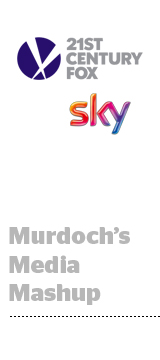 Twenty-First Century Fox revealed on Friday a preliminary bid to buy out the rest of British pay TV provider and telco Sky for $13.51 per share for a total of about $14.1 billion. Fox already owns a 39.1% stake in the company.
Twenty-First Century Fox revealed on Friday a preliminary bid to buy out the rest of British pay TV provider and telco Sky for $13.51 per share for a total of about $14.1 billion. Fox already owns a 39.1% stake in the company.
In 2010, Rupert Murdoch’s News Corp. attempted to take over Sky (called British Sky Broadcasting at the time), but tabled the deal over pressures surrounding a phone hacking scandal at News International.
While telcos and TV providers are consolidating, Murdoch might have a more immediate motivation in buying the rest of Sky.
“It’s a hedge against exposure to the US for Sky,” said Brian Wieser, a senior equity analyst at Pivotal Research. “It’s always been known to Fox and Sky shareholders alike that Murdoch always wanted to combine the two companies, so the reasons for that combination are almost less important than, ‘They wanted to do it eventually.’”
There are, however, synergies beyond Murdoch’s personal motivations. Both companies are active ad tech investors. Fox bought true[x] for $200 million in 2014 and Sky invested $10 million in demand-side platform and DMP DataXu last year.
And both broadcasters have addressable and advanced TV divisions.
At Fox, that’s led by Joe Marchese, its president of advanced advertising and formerly true[x]’s CEO. And Sky’s media and advertising division, Sky Media, focuses on addressable TV ads and partners with companies like Videology to create cross-screen video solutions.
Wieser sees more ways the two companies can align around media.
In markets where pay TV is less penetrated than in the US, Sky could benefit from licensing its content or programming to Fox more widely, Wieser hypothesized.
Fox could also foreseeably use Sky’s addressable TV ad server, AdSmart, to serve ads targeted to different household demographics and data attributes.
And if Fox were to close its deal with Sky, both would gain regional expertise.
“The UK market is very different than the US,” Wieser said. “There’s no such thing as local advertising on TV historically in the UK, and AdSmart made it possible to do more in addressable.”
“TV is not a global thing from an advertiser’s perspective,” he added. “It’s very localized,” which would prove mutually beneficial.
This post was syndicated from Ad Exchanger.

More Stories
Meta’s Threads Begins Global Ad Rollout Within Its Feed
Adtech Firm Criteo Is Pitching Hundreds of Retailers on a New Video Ad
2degrees gets loud about NOtifications